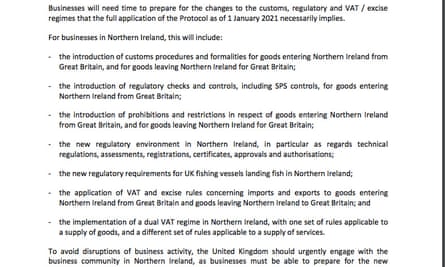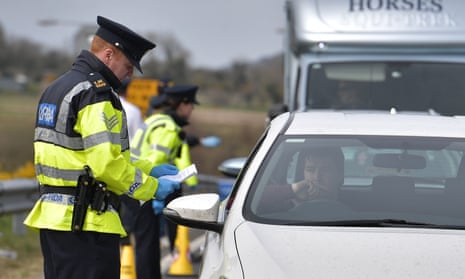Brexit could put at risk the contact tracing of coronavirus patients on the island of Ireland if the UK crashes out of the EU without a trade deal at the end of the year, the health minister in the Northern Ireland assembly has conceded.
Contact tracing in the region is expected to resume next week but may face challenges if the virus, as is probable, continues to threaten communities beyond the 31 December deadline for a Brexit trade deal, local politicians have said.
The tracing of number plates, flight passenger lists and coronavirus test results could become impossible unless the UK agrees a deal on its future relationship with the EU that includes security and data-sharing arrangements.
“What detail, what level of information we share [in 2021] has still to be worked out,” said Robin Swann, Stormont’s health minister.
Data shared between authorities in Belfast and Dublin helped in February to trace passengers on a plane that landed in Dublin airport who may have had contact with a resident who went on to Northern Ireland and later tested positive for coronavirus.
The Social Democrat and Labour party assembly member Matthew O’Tooleasked Swann if this would continue beyond December in the absence of a trade deal or extension to the transition period.
“We will probably still be contact tracing people, we will still be moving from Dundalk to Newry and Buncrana to Derry,” said O’Toole in reference to border towns. “Is there a risk that if we leave the transition period without a deal and there is legal uncertainty around our information governance framework that would put contact tracing particularly in border areas into risk?”
Swann replied that it had been flagged as an issue under Brexit’s Operation Yellowhammer contingency planning but that no action could be taken until they knew what shape Brexit would take.
“This is new to this island, this is new to the UK, this is new to Europe and we look at how we actually start to do this level of contact tracing so when it comes to legalities, who holds the information? Is it held on your phone, is it held in a central database? That all has to be [worked out] at this point of time,” he told the Stormont assembly.
“Let’s get it up and running and we will work round the rest of it when we get to the end of the year and we see where we are in regards to Brexit.”
Swann’s comments come as the European commission told the UK that time was short to implement the Northern Ireland protocol that Boris Johnson included in the withdrawal agreement in January.
A technical note issued by Brussels put flesh on the bones of the protocol and served as a reminder of the scale of the challenge facing businesses and now health authorities in the face of a national health emergency.

After the first meeting of the specialised committee of EU and UK officials tasked with implementing the Northern Ireland rules, the commission said the exchanges “now urgently need to be followed up by tangible measures”.
Andrew McCormick, a senior official from the Northern Ireland civil service, was present at the meeting.
